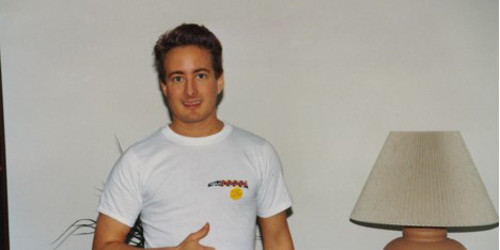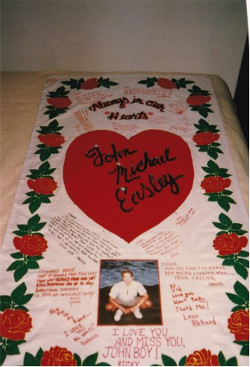
The late John Michael Easley. Photos courtesy of Joan Harrison

Staff members at Transcendence Behavioral Health in Royal Oak will host the "Always in Our Hearts" Celebration of Life Display to honor those lives lost to AIDS as well as those infected and affected by HIV/AIDS.
Sections of the NAMES Project AIDS Memorial Quilt will be on display at their office from 12-5 p.m. at 618 E. 11 Mile Road on June 3-4.
Dr. Stephanie Williams began her practice working with the positive community in 2001. The inspiration for this event came from the support group that she runs with another therapist, Dale Rogalski.
"We want to do something to remember clients we have had that have died as a result of HIV/AIDS. We also want to honor our clients and the other Michigan veterans of the HIV/AIDS epidemic that continue to live on despite profound loss. We feel like not enough is done in our community to honor and remember these veterans. We never want to forget them," said Williams.
The AIDS Memorial Quilt is the largest ongoing community arts project in the world. Founded in 1987, each block of the quilt measures 12 square feet and usually consists of eight panels sewn together. Each of the 48,000 panels commemorates a person whose life was lost to AIDS. As more and more people are lost to the epidemic, the quilt is added to and often used in displays for AIDS walks and other educational contexts around the world. First displayed on Oct. 11, 1987 at the National Mall in Washington, D.C., the quilt contains contributions from virtually every state and almost 30 countries. It stands in remembrance of the more than 90,000 people lost to HIV/AIDS.
In Memory Of
When Joan Harrison thinks about her brother John Michael Easley, she remembers how outgoing he was.
"He could make anybody laugh. He had a wicked sense of humor," she said about the man who changed her life drastically. Easley wasn't just her brother while they were growing up in the city of Romulus. "He filled a role as my father. He was a best friend, someone I would go to for everything."
Harrison was 12 years old when Easley came out.
"I had an idea that maybe he was gay, but didn't know for sure," she said. "It didn't change our opinion of him. He didn't hide from our family."
Harrison described Easley as an "extremely motivated" person who was the first one in their family to go to college at Eastern Michigan University where he studied nursing and would pay his own way to become a nurse anesthetist.
Easley was no more than 22 years old when he discovered he was HIV positive.
"I believe he contracted it from an individual he really trusted," said Harrison. "He felt like he would lose everything. He really changed. He hid from us. He didn't want us worrying so he didn't talk about it. He downplayed the severity."
Easley died at home in July 1994. He was 28 years old.
"We were told his heart just stopped. I was the first one called. Being the baby, I felt just devastated that I had to break it to our brother, Paul, then go to our mother. It was a horrific time," she said.
Later, a friend explained to their family how to make a panel in memoriam.
"This was something tangible. Our way to say to the world I need you to remember him," said Harrison. About 15 years have passed since she has seen her brother's panel.
"It will be nice for people to know how extremely devoted to others and to the community he was. He contributed so much. It is a huge loss."
Easley's stories and many others are preserved through the AIDS Memorial Quilt Archive Project.
Finding the Right "Fit"
When reflecting upon her brother's battle with depression towards the end of his life, Harrison said his therapist "unfortunately wasn't very helpful."
That's why Rogalski said it is important when choosing a therapist to find one that is empathetic or sympathetic to the person's life, sexual orientation or gender identity.
This is another reason for the quilt display – to remind visitors that although HIV/AIDS has moved from a fatal to chronic disease with the creation of antiretroviral medications, it still leaves those infected with tremendous challenges to their physical, emotional and social well being.
"Persons living with HIV have an increased risk for developing mood, anxiety and cognitive disorders. Having a therapist that is educated about HIV/AIDS is important in helping the client maintain a healthy and productive life."
Rogalski said the stigma attached to HIV/AIDS impacts those suffering.
"They often feel shame and guilt for carrying this disease. Taking daily medications may also remind them that they have the disease and disclosure about the disease to family, friends and coworkers may cause the client additional anxiety."
Although HIV/AIDS deaths have declined over the past few decades it is still one of societies leading causes of death. Rogalski reminds the community that HIV is not just a gay disease and that it does not discriminate based on one's gender, ethnicity, socioeconomic status or race.
"Often, clients come in for therapy when they first receive the news that they are HIV positive. They are understandably scared and concerned about their future and are dealing with the profound loss of the life they thought they had. They may not have another person in their life to express their feelings about this diagnosis and may even be suicidal," he said. "Again, it is critical for the therapist to be knowledgeable (about HIV/AIDS), non-judgmental and sensitive to the client in their delicate emotional state. Instilling trust and hope is important to this process as well as developing a treatment plan involving all those in the clients network of medical and psychological professionals."










